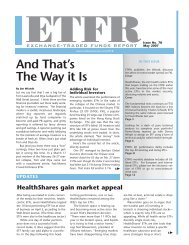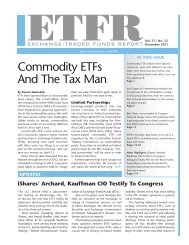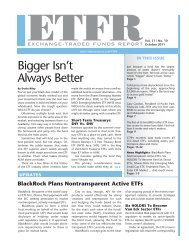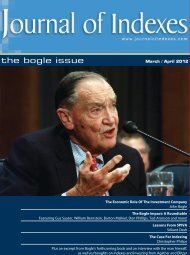How to Kill a Black Swan Remy Briand and David Owyong ...
How to Kill a Black Swan Remy Briand and David Owyong ...
How to Kill a Black Swan Remy Briand and David Owyong ...
Create successful ePaper yourself
Turn your PDF publications into a flip-book with our unique Google optimized e-Paper software.
odology for dueling exchange-traded<br />
trusts that shift assets (in the form of<br />
Treasuries) back <strong>and</strong> forth between<br />
each other according <strong>to</strong> the positive or<br />
negative movements of the underlying<br />
commodity price or index.<br />
The flagship products—the Macro-<br />
Shares Oil Up trust <strong>and</strong> the MacroShares<br />
Oil Down trust—ran in<strong>to</strong> trouble last<br />
year when the price of oil skyrocketed,<br />
sucking all the assets out of the<br />
“Down” fund <strong>and</strong> forcing the closure<br />
of both products.<br />
MacroMarkets tried again a few<br />
months later with another set of oiltracking<br />
products that had a little more<br />
flexibility—the MacroShares $100 Oil<br />
Up Trust (NYSE Arca: UOY) <strong>and</strong> the<br />
MacroShares $100 Oil Down Trust<br />
(NYSE Arca: DOY). <strong>How</strong>ever, those products<br />
never gained much popularity, <strong>and</strong><br />
it was announced in mid-May that the<br />
firm was invoking a rule that allowed it<br />
<strong>to</strong> terminate the funds if one or both of<br />
them fell below $50 million in assets;<br />
UOY <strong>and</strong> DOY, which had about $20<br />
million in combined assets at the time<br />
of the announcement, are set <strong>to</strong> s<strong>to</strong>p<br />
trading on June 25.<br />
Just days later, the firm announced<br />
that its unprecedented initial public<br />
offering for its pending products<br />
tracking the S&P/Case-Shiller Home<br />
Price Composite 10 Index had failed,<br />
<strong>and</strong> it would be using a traditional,<br />
market-maker-driven process <strong>to</strong><br />
launch the Major Metro Housing Up<br />
(NYSE Arca: UMM) <strong>and</strong> the Major<br />
Metro Housing Down (DMM) trusts.<br />
Apparently, dem<strong>and</strong> for the Up <strong>and</strong><br />
Down funds from IPO bidders was<br />
<strong>to</strong>o lopsided; additionally, inves<strong>to</strong>rs<br />
seemed <strong>to</strong> be put off by the extra<br />
commission costs that came with purchasing<br />
a traditional IPO.<br />
The home price trusts were expected<br />
<strong>to</strong> launch with $5 million in seed money<br />
from a market maker shortly after the<br />
failure of the IPO was announced.<br />
INDEXING DEVELOPMENTS<br />
Home Price Indexes<br />
Slow Their Descent<br />
The S&P/Case-Shiller Home Price<br />
indexes, while grim, showed some<br />
mildly positive signs for February.<br />
For the first time in 16 months, the<br />
benchmarks’ fall didn’t set new records<br />
for year-over-year losses, according <strong>to</strong> the<br />
monthly results released in late April.<br />
In fact, 16 of the 20 metro areas<br />
saw smaller losses in February than in<br />
January, although all 20 metro areas<br />
covered by the indexing series produced<br />
a monthly decline in February. All<br />
in all, average U.S. home prices are at<br />
similar levels <strong>to</strong> where they were in the<br />
third quarter of 2003. From the peak<br />
in mid-2006, the 10-City Composite<br />
Index was down 31.6 percent <strong>and</strong> the<br />
20-City Composite was down 30.7 percent<br />
through February 2009.<br />
On an annualized basis, three metro<br />
areas fared the best: Dallas dropped 4.5<br />
percent <strong>and</strong> turned in the best performance,<br />
while Denver fell some 5.7 percent<br />
<strong>and</strong> Bos<strong>to</strong>n lost 7.2 percent. The<br />
three worst-performing cities continue<br />
<strong>to</strong> be from the Sun Belt: Phoenix was<br />
down 35.2 percent, with Las Vegas <strong>and</strong><br />
San Francisco down 31.7 percent <strong>and</strong><br />
31 percent, respectively.<br />
CDR Rolls Out<br />
Government Risk Index<br />
In late March, Credit Derivatives<br />
Research LLC launched a new index<br />
designed <strong>to</strong> track the creditworthiness<br />
of leading sovereign deb<strong>to</strong>rs. The<br />
Government Risk Index tracks credit<br />
default swap spreads for the United<br />
States, the United Kingdom, Germany,<br />
France, Italy, Spain <strong>and</strong> Japan.<br />
Sovereign CDS essentially insure a<br />
buyer against a credit event, like a default,<br />
related <strong>to</strong> the issuing country’s debt. With<br />
governments taking actions like buying up<br />
<strong>to</strong>xic assets in the wake of the credit crisis,<br />
thereby increasing risk levels, CDS costs<br />
have also increased.<br />
Pull Quote Pull Quote Pull Quote<br />
Pull Quote Pull Quote Pull Quote<br />
Pull Quote Pull Quote Pull Quote<br />
Sovereign CDS essentially insure a buyer<br />
against a credit event, like a default,<br />
related <strong>to</strong> the issuing country’s debt.<br />
www.journalofindexes.com July/August 2009<br />
45
















